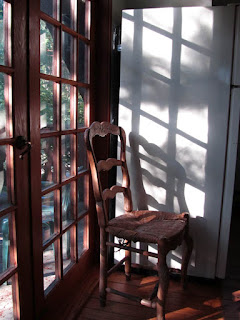We had been house shopping for months, and finally made an offer on a house we loved, a 70-year-old farmhouse on 2 acres of land, close to an elementary school, with a barn and a stream. Of the several offers they received, ours was the highest -- and they turned around and sold it to a neighbor for a dollar more.
We were devastated, and defeated, and put an offer on the next reasonable house that appeared on our spectrum, without really noticing that it was down in a valley, surrounded by tall cedars; not really noticing that it was a split level home with a daylight basement, or that the "territorial view" included nothing but trees.
All we saw was the way the sunlight dappled the front of the house and filtered in to the dining room through the french doors that led onto the deck. We fell in love with the light -- and then it disappeared.
We hated the house for all the years we owned it: it was dark and gloomy nine months of the year, with ugly textured walls and huge dark wood beams, gold 70's carpet on most of the floor and dark boards elsewhere with little grooves that captured dirt and dust with fierce determination. Though there were white tiles on the kitchen floor and counter, their grout was impossible to keep clean. It was so much colder than the towns around us that it would snow there so our car couldn't climb the hill to get out, even when there was no snow elsewhere in the town.
Nothing could grow in the yard but crabgrass, ferns, and some sort of weed with pink flowers that smelled like skunk; everything else we planted died for lack of light -- and in those days, incarcerated with two small children after a lifetime of increasingly well--paying jobs, longing for my husband who was working 12 to 14-hour days, I felt like I was dying, too: the house became a symbol of the darkness in my life.
Now, of course, we live in a house that is all windows, all light, with only two small trees that offer little shade. But I thought of that old house this morning, when I read these lines from Thomas Merton's Chuang Tzu, which seem to be a continuation of this idea of listening with the eyes:
"Fasting of the heart means hearing, but not with the ear... The hearing that is only in the ears is one thing. The hearing of the understanding is another. But the hearing of the spirit is not limited to any one faculty, to the ear, or to the mind. Hence it demands the emptiness of all the faculties. And when the faculties are empty, then the whole being listens. There is then a direct grasp of what is right there before you that can never be heard with the ear or understood with the mind. Fasting of the heart empties the faculties, frees you from limitation and from preoccupations. Fasting of the heart begets unity and freedom... If you can do this, you will be able to go among men in their world without upsetting them. You will not enter into conflict with their ideal image of themselves...
Look at this window. It is nothing but a hole in the wall, but because of it the whole room is full of light. So when the faculties are empty, the heart is full of light. Being full of light, it becomes an influence, by which others are secretly transformed."
I was not completely deprived of light in that old house. But I was younger then, with little understanding of concepts like these, of listening with the heart or the eyes, and so I felt deprived of light -- and brought little light, therefore, into the lives of those around me. I wonder now, if I were to go back, I'd find the house had far more charm than I was capable of seeing at the time...

No comments:
Post a Comment